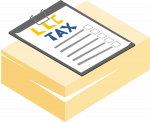North Carolina LLC Taxes
By default, North Carolina LLCs are taxed as pass-through entities. This means that the LLC itself does not pay federal taxes. Instead, the company’s revenue is “passed through” to its members, who then report it as income on their personal taxes. The members are then responsible for paying the 15.3% federal self-employment tax rate (12.4% for social security and 2.9% for Medicare). North Carolina has the lowest corporate net income tax in the country (just 2.5%!), and a low state-wide sales tax rate of just 4.75%. Your LLC may also need to pay taxes to your local municipality, too.
In this article, we'll cover:


How Are North Carolina LLCs Taxed?
Not all North Carolina LLCs are taxed the same. If your LLC keeps its default tax status, it can be taxed one of two ways: either as a single-member LLC (or SMLLC), which is taxed as a sole-proprietorship, or a multi-member LLC, which is taxed as a partnership. For LLCs that maintain their default tax status, here are the federal tax forms that your LLC will need:
- Single-member LLC—Form 1040 (usually Schedule C, but some SMLLCs file C-EZ, E, or F)
- Multi-member LLC—Form 1065
However, your North Carolina LLC can also choose to be taxed as an S-corp or a C-corp. Continue reading to understand what this means for your taxes.
North Carolina LLCs taxed as S-corp
If you choose, you have the option to elect S-corp status for your LLC. Electing S-corp tax status means your LLC will still be taxed as a pass-through entity, but unlike LLCs with default status, your LLC will be able to make distributions to its members without having to pay the 15.3% self-employment tax. If you’re interested in electing S-corp status for your LLC, you can do by filing Form 2553 with the IRS.
You’ll want to make sure your LLC meets the IRS requirements for S-corps before applying. Just because you’ve chosen S-corp status doesn’t necessarily mean your LLC will save money, and choosing this tax status makes filing taxes more complicated than keeping your company’s default status. We recommend consulting with a CPA first to see if electing S-corp status is the right move for your LLC.
LLCs taxed as C-corp
Some LLCs can benefit from being taxed as a C-corp, which is the default tax status for corporations. Although electing C-corp status is not common, some LLCs can benefit from being taxed as a C-corp. Again, we recommend consulting with a CPA on what’s best for your business before electing this status with the IRS.
Electing C-corp status means your LLC may be more attractive to investors. Your company will also be eligible for bigger tax deductions than if it were taxed as a default LLC, but your C-corp will need to pay the federal corporate income tax of 21%, as well as the North Carolina annual franchise tax.
C-corps file Form 1120 with the IRS.

North Carolina State Income Tax
Starting in 2022, North Carolina has a personal tax income rate of 4.99%. Members will be required to pay this tax when they report their personal income to the state on top of the federal taxes.
If your LLC is taxed as an S-Corp, you’ll be required to pay the state’s franchise tax. The minimum franchise tax is $200 for the first million dollars your LLC earns. If your S-corp exceeds this amount, you’ll need to pay an additional $1.50 for every $1,000 your LLC earns beyond the first million.
If you’ve chosen C-corp status, North Carolina’s state franchise tax gets a little more complicated. The same rate applies ($1.50 for every $1,000), but you’ll need to configure the following totals and pay whichever results in the highest amount due.
- Net worth
- Investment in tangible North Carolina property
- 55% of the appraised value of tangible North Carolina property

Sales and Use Tax
North Carolina has a sales tax rate of 4.75%, and cities and municipalities can add up to an additional 2.75%.Counties can also implement other taxes. For example, Durham, Orange, and Wake county all asses a transit county sales and use tax at 0.50%. You can find a complete list of sales and use tax ratesfor each North Carolina county on the North Carolina Department of Revenue website.

Local North Carolina Taxes
It’s important that you follow local tax laws in the city or county where your LLC is located and anywhere else your business operates. Some municipalities charge other, local taxes on certain goods and services, like cigarettes, cell phone plans, alcohol, real estate, and gasoline.

Other Taxes in North Carolina
Here are some other North Carolina taxes you may need to pay.
North Carolina State Employer Taxes
If you hire employees, you’ll be subject to the North Carolina unemployment insurance tax and workers’ compensation insurance:
- Unemployment Insurance (UI) Tax—Your LLC will need to pay unemployment tax if its gross payroll is a minimum of $1,500 in a calendar quarter, or if you’ve hired at least one employee for 20 different weeks throughout the year. Tax rates range depending on the size and age of your company, but you’ll end up paying somewhere between 0.06% to 5.760%. You can find a breakdown of unemployment insurance tax rates on the North Carolina Department of Commerce website.
- Workers’ Compensation Insurance—North Carolina requires all businesses that employ three or more employees to purchase workers’ compensation insurance or qualify as self-insured employers. This includes corporations, LLCs, partnerships, and sole proprietorships. On average, workers’ compensation insurance will cost about $0.84 per $100 covered in your payroll. However, this rate can vary depending on where you purchase your insurance, the amount on your payroll, how many employees you have, what industry you’re operating in, and other risk factors.
If you want to learn more about North Carolina employer taxes, visit the North Carolina Department of Revenue (NCDOR) Tax Resource Library.
Industry Taxes
Industry taxes (aka excise taxes) are extra taxes charged to businesses who participate in certain industries in North Carolina. You may need to pay other taxes depending on what you’re selling. The North Carolina Department of Revenue has a list of industry specific taxes:
- Motor Fuels Tax
- Motor Carriers Tax
- Alcoholic Beverages Tax
- Piped Natural Gas Tax
- Privilege Licenses Tax
- Tobacco Products Tax
- Cigarettes Tax
- Real Estate Tax
- Cellphone (Wireless) Services Tax

Do foreign LLCs in North Carolina need to pay North Carolina taxes?
Absolutely. If you have a North Carolina foreign LLC (an LLC that’s operating in North Carolina, but was formed somewhere else), you will still need to pay state income tax and any local taxes where your business operates. Make sure you check in with the local government to see if you need to register for any other sales and use taxes or other local taxes. If you’ve elected S-corp or C-corp status for your LLC, you’ll also be required to pay the annual franchise tax.





